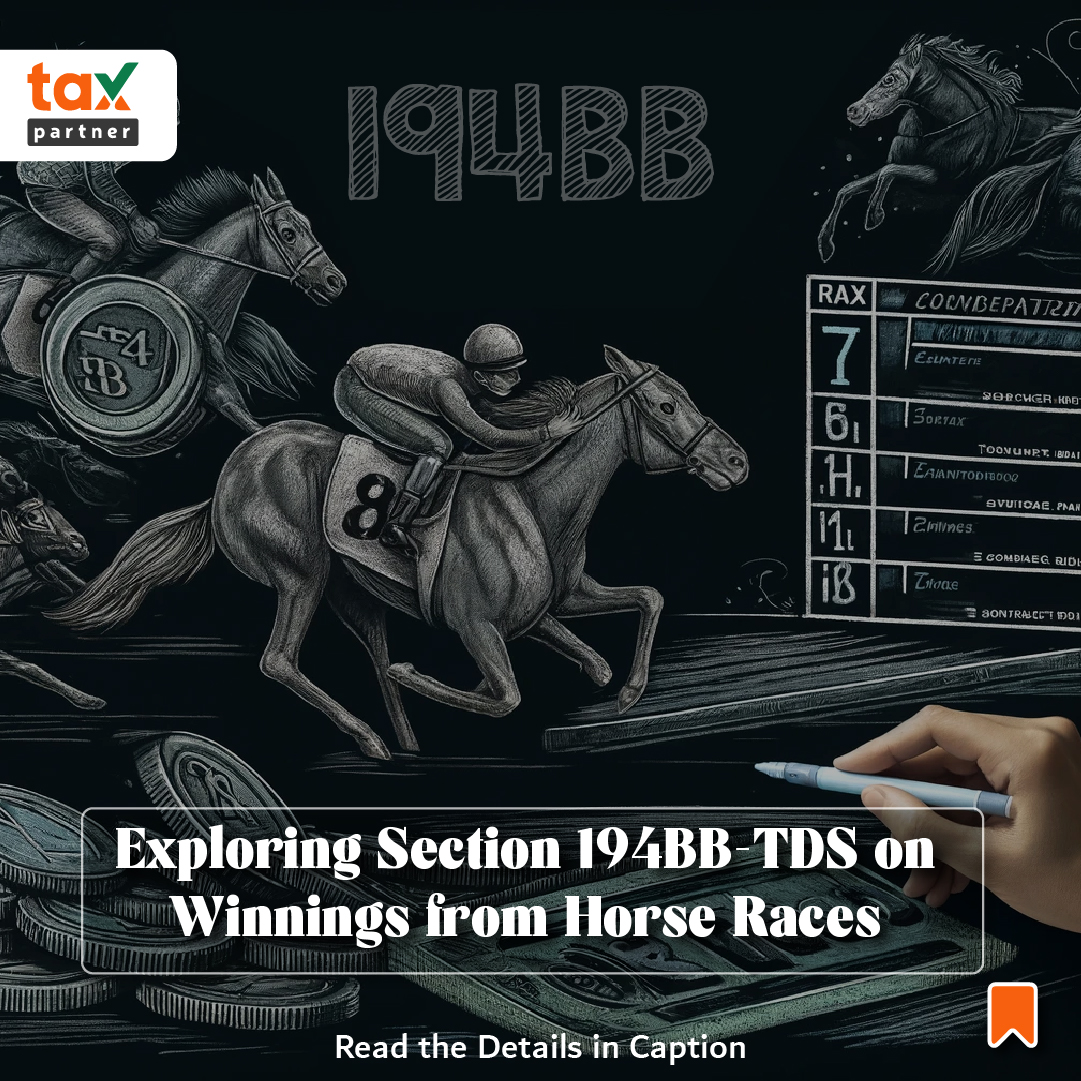Connect with us for all your queries



Tax Deducted at Source (TDS) is a mechanism introduced by the Indian government to collect taxes at the source of income generation. It ensures that tax is deducted in advance from various sources of income to facilitate smooth tax collection and compliance. TDS serves as a tool to prevent tax evasion and spread the tax burden equitably among taxpayers.
Section 194BB of the Income Tax Act, 1961, pertains specifically to the taxation of winnings from horse races. It mandates that any person responsible for paying winnings exceeding a specified threshold from horse races must deduct TDS before making the payment to the recipient. This provision ensures that taxes are collected promptly on income earned from gambling activities like horse racing, aligning with the broader principles of tax compliance and revenue generation.
Currently, Section 194BB requires TDS to be deducted on winnings from horse races exceeding ₹10,000 in a financial year. This threshold serves as a benchmark beyond which the payer is obligated to deduct TDS and deposit it with the government treasury.
Understanding Section 194BB is crucial for both the entities responsible for making such payments and the recipients of winnings from horse races. It not only facilitates tax compliance but also contributes to the efficient administration of tax revenues in India's fiscal framework.
How This Article Can Help
This article aims to provide clarity and guidance on the provisions of Section 194BB:
Applicability and Threshold under Section 194BB
Liable Entities for TDS Deduction
Under Section 194BB of the Income Tax Act, 1961, the responsibility to deduct Tax Deducted at Source (TDS) falls on any person or entity making payments for winnings from horse races. This includes racecourse managers, betting organizers, or any other entity disbursing such winnings.
Threshold Limit for TDS Deduction
Rate of TDS under Section 194BB
Standard TDS Rate
The standard rate of Tax Deducted at Source (TDS) applicable to winnings from horse races under Section 194BB of the Income Tax Act, 1961, is 30%. This means that any entity responsible for making payments for winnings from horse races exceeding ₹10,000 in a financial year must deduct TDS at this rate before disbursing the winnings to the recipient.
Variations and Special Provisions
Understanding these nuances helps entities involved in horse racing events to accurately compute and deduct TDS as per the provisions laid down by the Income Tax Act. It ensures compliance with tax laws while facilitating the efficient collection of taxes on income generated from gambling activities like horse races.
Procedure for TDS Deduction under Section 194BB
Timing of TDS Deduction
Tax Deducted at Source (TDS) under Section 194BB of the Income Tax Act, 1961, should be deducted at the time of payment of winnings from horse races. The payer, which could be a racecourse manager, betting organizer, or any other entity making such payments, is responsible for deducting TDS before disbursing the winnings to the recipient.
Calculation of TDS
TDS under Section 194BB is applicable when the winnings from horse races exceed ₹10,000 in a financial year. Here’s how the calculation works:
Example Calculation:
Suppose a recipient wins ₹15,000 from horse races in a financial year.
Thus, the entity making the payment would deduct ₹1,500 as TDS and pay the balance ₹13,500 to the recipient.
Understanding the timing and calculation of TDS ensures compliance with tax regulations and facilitates smooth operations in the disbursement of winnings from horse races under Section 194BB
Exemptions from TDS under Section 194BB:
Exclusion Scenarios (when TDS under Section 194BB may not be applicable):
1. Filing and Payment of TDS:
2. Issuance of TDS Certificate (Form 16B):
3. Quarterly Returns (Form 26Q):
Important Notes:
Section 194BB of the Income Tax Act mandates TDS on winnings from horse races and other games exceeding Rs. 10,000, with exemptions for certain entities and winnings below the threshold. Compliance requires timely deposit of TDS using Challan ITNS 281, issuance of Form 16B to recipients detailing winnings and TDS, and quarterly filing of Form 26Q. Recent updates announced in Union Budgets or CBDT notifications may impact rates and compliance procedures. Complying with these provisions is crucial, ensuring legal adherence, operational efficiency, and trust with stakeholders. Looking forward, expected trends include technological enhancements in filing processes, potential policy adjustments, and a focus on robust compliance frameworks to navigate evolving tax requirements effectively.
Tax Partner is India’s most reliable online business service platform, dedicated to helping you in starting, growing, & flourishing your business with our wide array of expert services at a very affordable cost.